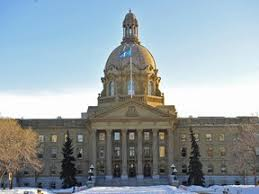
- A court hearing is underway in Edmonton to determine whether a proposed referendum on Alberta separating from Canada is constitutional. The referendum question, submitted by Mitch Sylvestre of the Alberta Prosperity Project, asks voters whether “Alberta shall become a sovereign country and cease to be a province in Canada.” Arguments involve lawyers for Sylvestre, the Province’s Chief Electoral Officer, five First Nations intervenors, and two amicus curiae lawyers tasked with objectively examining constitutionality. The amicus lawyers argue the referendum would conflict with multiple constitutional provisions and remove protections for residents if Alberta became independent. Sylvestre’s lawyer contends Albertans should have the right to debate separation under the Citizen Initiative Act. First Nations groups argue the referendum would violate Aboriginal and Treaty rights. Court of King’s Bench Justice Colin Feasby is expected to issue a ruling at a later date.
- Alberta’s government released the report from its “Aggression and Complexity in Schools Action Team,” a 25-member group formed to address rising behavioural and learning challenges in classrooms. The report identifies factors such as academic struggles, behavioural issues, socioeconomic pressures, language barriers, and mental-health concerns as contributors to classroom complexity. It recommends developing class-size criteria, improving cross-ministry coordination to help families navigate supports, and restoring expanded early-childhood funding that had previously been cut. The government says detailed class-size and composition data - being collected throughout November and released in January - will guide future decisions. Premier Danielle Smith and Education Minister Demetrios Nicolaides also committed to hiring 1,500 additional education assistants and 3,000 more teachers over the next three years. Cross-ministry collaboration, involving mental health, children’s services and social services, will shape the next phase of planning. Some immediate steps are still undefined, as Nicolaides said the report must first go to a cabinet committee before resources are allocated.
- The Alberta government has invoked the notwithstanding clause to shield three laws affecting transgender youth and adults from ongoing and future court challenges. Premier Danielle Smith argues the move is necessary to protect children, particularly provisions that restrict puberty blockers and hormone therapy for those under 16 and ban gender-affirming surgeries for minors. The laws also require parents to be notified if a child under 16 changes their name or pronouns at school, and restrict female sports divisions to individuals born female. Supporters of legal challenges argue the government is avoiding judicial scrutiny and spreading misinformation. Smith counters that long court delays would put children at risk and says the government is reflecting the will of most Albertans. Despite the clause, advocacy groups plan to continue their legal fight.
- A new report from Alberta’s Auditor General concludes the Province wasted about $125 million on failed efforts to privatize community lab services through Dynalife. The investigation found major breakdowns in procurement, financial analysis, and governance, with the health ministry inserting itself into decisions that should have been made by Alberta Health Services. When Dynalife took over in late 2022, patients - especially in Calgary - faced long waits, reduced access, delayed test results, and a spike in diagnostic errors. The deal collapsed within months as Dynalife warned it was nearing bankruptcy, forcing the government to buy out its assets and return lab work to the public system. Wylie’s report also criticizes poor record-keeping, restricted access to information, and destroyed documents that hampered the investigation. Opposition MLAs say the findings show the dangers of health-care privatization, while the government insists it acted quickly once service problems became clear. The Auditor General is conducting additional probes into other recent procurement issues, even as the government has chosen not to renew his contract.
- Speaking of the healthcare system, Premier Danielle Smith has confirmed plans to let doctors work in both the public and private systems under a new “Dual Practice Surgery Model,” which she says will reduce wait times by allowing surgeons to perform required public surgeries while taking on additional private procedures in their off-hours. The government argues the change could help retain physicians and address the backlog of more than 80,000 people waiting for elective surgeries. Medical organizations, however, warn the move could deepen inequality, lengthen public wait times, and force patients to pay twice for care. Alberta’s medical students say a two-tier system would disadvantage those unable to afford private treatment, while some physicians question whether burned-out staff have capacity for extra work at all. Critics also warn the plan may violate the Canada Health Act, risking federal penalties or legal challenges. Supporters say the model aligns Alberta with countries like Sweden and Australia.

